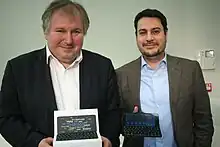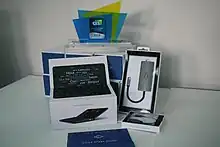Gemini PDA
The Gemini PDA is a personal digital assistant[1] designed by Planet Computers[2] in association with Martin Riddiford, who formerly worked on the Psion Series 5 in the 1990s,[3] and crowdfunded via Indiegogo in 2017.[4] The Gemini bucks the trend of modern smartphones in its screen being primarily used in landscape aspect, and having a keyboard, i.e. taking on the form of a subnotebook.
.png.webp) | |
| Manufacturer | Planet Computers |
|---|---|
| Compatible networks | |
| First released | 2018 |
| Predecessor | Psion Series 5, Psion Series 7 |
| Successor | Cosmo Communicator, Astro Slide 5G Transformer |
| Type | Subnotebook personal digital assistant smartphone |
| Form factor | Wide clamshell design, with physical keyboard |
| Dimensions | 15.1 mm (0.59 in) H 171.4 mm (6.75 in) W 79.3 mm (3.12 in) D |
| Mass | 320 g (11 oz) |
| Operating system |
|
| System-on-chip | Mediatek MT6797X Helio X27 |
| CPU | 10×ARM Cortex-A:
|
| GPU | Quad Core ARM Mali (GPU) T880 MP4 @875MHz |
| Memory | 4 GB LPDDR3 RAM |
| Storage | 64 GB |
| Removable storage | microSDXC |
| Battery | 4,220 mAh |
| Display | 5.99 in (152 mm) 2160×1080, 403 dpi |
| External display | HDMI via right-hand USB port |
| Sound |
|
| Rear camera | 5 MP (optional) |
| Front camera | 5 MP |
| Connectivity | |
| Data inputs |
|
| Website | www |

Planet supports running two operating systems on the device, and it dual-boots between Android and Linux.[5] Other possibilities include Sailfish OS.
Before January 2018, preproduction devices were made available to reviewers, and mass production was in full swing in December 2017 with devices starting to ship in late January 2018 to Indiegogo backers.
Hardware
- CPU/GPU system on a chip is a MediaTek Deca Core Helio, either the X25 or X27 chipset.
- 2x Cortex A72 @ 2.6 GHz
- 4x Cortex A53 @ 2.0 GHz
- 4x Cortex A53 @ 1.6 GHz
- ARM Mali T880 MP4 @ 875 MHz
- RAM: 4 GB
- Flash: 64 GB
- microSDHC card slot
- Two USB-C connectors, only one of which can be used to charge it. Video out is possible with a proprietary HDMI adaptor, and not the standardised USB-C alternate mode.
- Display: 5.99" LCD, 2160×1080 (403 ppi, 2:1 aspect ratio)
- Mass: 320g
- Dimensions (mm): 171.4(W) × 79.3(D) × 15.1(H)
- Bluetooth: 4.1
- Wi-Fi: 802.11a/b/g/n/ac
- Radio bands (4G variant):
- GSM 850/900/1800/1900 MHz
- CDMA 850/1900 MHz BC0 BC1+ EVDO
- UMTS 900/2100 MHz
- LTE 1/2/3/4/5/7/12/17/20/41 (with VoLTE)
- MicroSIM slot and eSIM (4G variant)
- Battery: 4220 mAh
- Front camera 5 Mp
- GPS: with AGPS
- Sensors: Accelerometer, light sensor, gyro, magnetic sensor
- Audio:
- stereo speakers
- 3.5mm headphone jack
- dual microphones[6]
Some early devices were made with the X25 SoC as specified in the Indiegogo campaign, with the factory switching to X27 as stocks of the older X25 were depleted. They also have the eSIM feature disabled.
Two variants are sold, one with Wi-Fi only, one with Wi-Fi and mobile phone radios.
Optional accessories

The original Indiegogo campaign allowed backers to pay extra for various accessories and features:
- Leather pouch
- HDMI adaptor
- Rear camera 5Mp
- USB-C hub
Successors
Planet Computers announced successor models to the Gemini called Cosmo Communicator and Astro Slide 5G Transformer.
References
- Orlowski, Andrew (21 February 2018). "The Gemini pocket PC is shipping and we've got one. This is what it's like". The Register. Retrieved 21 March 2018.
- "The New Gemini PDA – Type and Create on the move!". www.planetcom.co.uk. Retrieved 14 May 2018.
- Miles, Stuart (6 January 2018). "Planet Gemini PDA initial review: The Psion organiser makes a comeback of sorts". Pocket-lint. Retrieved 21 March 2018.
- Munn, Edward; Minasians, Christopher. "The new Gemini PDA: Hands-on with the new PDA smartphone that runs on Android". Alphr (PC Pro). Retrieved 21 March 2018.
- Summers, Nick (26 February 2018). "I found a Gemini PDA running Sailfish OS, and it was wild". Engadget. Retrieved 21 March 2018.
- Tech Specs
External links
 Media related to Planet Computers Gemini PDA at Wikimedia Commons
Media related to Planet Computers Gemini PDA at Wikimedia Commons- Official website